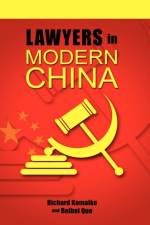von Richard Komaiko
120,00 €
The Chinese legal profession was revived in 1979 after the purges of the Cultural Revolution. In the thirty years since that revival, hundreds of law schools have been established, the bar has undergone exponential growth, and the legal economy has flourished. Indicia of progress abound, but signs of profound challenge remain. Western academia and media have given scant attention to these developments. To the extent that Western commentators pay any notice whatsoever, it is to human rights lawyers and challenges to the rule of the Communist party. But such a focus misses the larger picture. The most consequential developments in Chinese legality are occurring at the center, rather than the periphery, of what is considered politically acceptable. Where building the rule of law in China is concerned, the reliable enforcement of extant rights in contract, property, and tort is far more important than pushing for the recognition of new rights or changing the process whereby rights are created. At the heart of this process is China s growing legal profession. Their unique historical situation, their distinctive sociology, their competence, and the conditions of their practice, as well as several other factors, are indispensable components to understanding the growth of Chinese legality and the socialist rule of law. Justice Holmes wrote that the law is the witness and external deposit of our moral life. Its history is the history of the moral development of the race. This adage speaks to the intimate relationship between law and the structure, order, and values of a society. There is a growing interest in the structure, order, and values of China. This is all too reasonable given that one-fifth of the human population is in China, the Chinese economy is surging along to preeminence, and the Chinese state exerts an evergrowing influence on other states and international bodies. All recent trends underscore the fact that indifference to the Chinese system is a luxury that nobody can afford. Examining Chinese lawyers the people whose lives and purpose lay at the very heart of these currents provides an incomparable understanding of what China is today and may be in the future. Life in modern China is riddled with frustrations. Much has been written about the experience of such frustrations, from defective products to intellectual property piracy, but very little has been written about the underlying cause. The silence is broken by Lawyers in Modern China, which explains these frustrations as a natural result of the underdevelopment of the Chinese legal profession. As the Chinese state has slimmed down over the last thirty years, its ability to enforce laws and provide oversight in the lives and undertakings of the Chinese people has been diminished. The legal profession has not grown enough in size or strength to offset this loss. As a result, much of life in modern China takes place under conditions of low-level anarchy. The book explores several factors that contribute to the current state of underdevelopment of the legal profession, including weak demand for legal services, the balkanization of the profession, systemic sources of corruption, and a dearth of comprehensive yet affordable legal research tools. Finally, the book offers a set of tailored policy recommendations that are designed to ameliorate the problems that stifle the Chinese bar and cultivate it into a powerful force for the promotion of the rule of law. Lawyers in Modern China represents a contribution to multiple areas of scholarship, including the sociology of lawyers, law and economics, sinology, Chinese history, and political science. The foreword is by eminent international law professor, Dr. Tom Ginsburg, from the University of Chicago.

